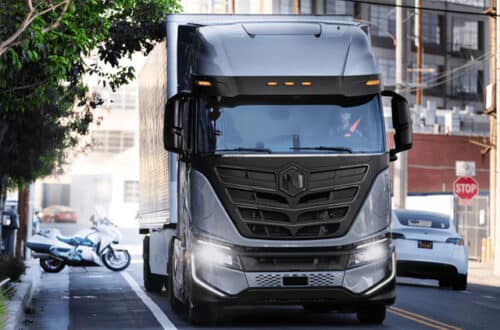
Audience
- Sentiment: cautionary
- Political Group: Moderate to Liberal
- Age Group: 30-50
- Gender: Both male and female
Overview
- Nikola Corp initially saw great success with ambitious plans in the electric vehicle sector but faced allegations of fraud.
- The company’s stock price dramatically declined after the 2020 Hindenburg report exposed misleading information.
- Nikola recently filed for Chapter 11 bankruptcy, highlighting the challenges faced by new entrants in the competitive automotive industry.
The Rise and Fall of Nikola Corp: A Cautionary Tale in the Electric Vehicle Industry
In the rapidly evolving world of electric vehicles (EVs), Nikola Corp was once a shining star. Founded in 2015, the company rose to fame with its ambitious plans for innovative electric and hydrogen-powered trucks. At its peak in 2020, Nikola was valued at over $30 billion—a staggering amount that seemed to promise a bright future for the company. However, the story took a dark turn, leading to its recent filing for Chapter 11 bankruptcy protection. What happened to Nikola Corp, and what can we learn from its journey?
The Promising Beginning
To understand the decline of Nikola, it’s important to look at how it started. When Trevor Milton, the founder, first launched the company, he captured the imagination of investors and the public alike with his bold vision. Milton talked about creating a new kind of truck that could run on electric batteries or hydrogen fuel cells. This was a cutting-edge idea, especially in a world increasingly focused on sustainability and reducing carbon emissions.
Many people saw Nikola as a competitor to Tesla, a company that had already made waves in the EV market. Nikola promised to produce not only electric trucks but also hydrogen-powered ones, which was seen as a breakthrough for long-haul trucking. The excitement around the company led to a massive increase in its stock price, with shares hitting nearly $80 by mid-2020. Investors were eager to jump on the electric vehicle bandwagon, believing they were buying into the future of transportation.
The Dark Turn
However, it didn’t take long for the honeymoon to end. In September 2020, an explosive report was published by Hindenburg Research, accusing Nikola of fraud. They alleged that the company had misled investors about its technology and capabilities. For example, the report claimed that some promotional videos of Nikola’s trucks were misleading, showing vehicles rolling down hills when they were actually powered by gravity and not electricity.
These allegations had serious consequences. The stock price plummeted, and Trevor Milton resigned as CEO shortly after. The company’s reputation was damaged, and investors began to lose confidence. In 2021, Milton was convicted of fraud, further tarnishing Nikola’s image and leading to a loss of trust among stakeholders.
The Repercussions
Despite these challenges, Nikola continued to push forward. The company did manage to produce some actual vehicles, like the Nikola Tre, an electric truck, and the Nikola Badger, a pickup truck that would combine electric and hydrogen fuel technology. However, the production process was fraught with issues. Reports of delays, difficulties in manufacturing, and quality control problems continued to surface.
By 2022, it became evident that Nikola was struggling financially. The company was sinking deeper into debt, facing recalls of its products due to safety concerns, and just couldn’t sell enough trucks to stay afloat. The various challenges in the market, including fierce competition from established automakers and supply chain disruptions caused by the pandemic, only made things worse.
All these factors accumulated to the point where Nikola’s stock hit rock bottom, trading for under $2 a share—a far cry from its heyday of nearly $80. The company was bleeding cash, with approximately $47 million left in the bank when it filed for Chapter 11 bankruptcy protection.
Chapter 11 Bankruptcy Explained
So, what does it mean for a company to file for Chapter 11 bankruptcy? Essentially, this legal process allows companies to restructure their debts and try to stay in business. It gives them time to create a plan to pay off creditors while continuing operations. Nikola has stated that they will auction off their assets as part of this process, which involves seeking court approval for selling off parts of the company to generate much-needed funds.
Filing for bankruptcy might seem daunting, but many companies have successfully navigated this path. In some cases, it can lead to a fresh start and a chance to regain stability. However, for Nikola, the future remains uncertain. Would they be able to rise again from this financial mess, or is this the end of the road for the ambitious startup?
Lessons Learned
There are several important lessons we can draw from Nikola’s story.
- The Importance of Transparency: One of the most significant issues for Nikola was trust. The allegations of fraud and misleading information not only hurt the company financially but also destroyed its credibility. For companies in emerging industries like electric vehicles, being transparent about capabilities and progress can build strong relationships with investors and customers.
- The Risks of Overhype: When new technologies emerge, it’s easy to get caught up in the excitement and hype. Nikola’s explosive growth was fueled by high expectations, which eventually led to a dramatic fall when the reality didn’t match those expectations. Balancing ambition with realistic projections is crucial in any business venture.
- The Need for Resilience: The automotive industry is incredibly challenging, filled with competition, technological hurdles, and changing market dynamics. Nikola faced many obstacles, from production issues to a lack of consumer trust. The ability to adapt and stay resilient is essential for survival.
- Regulatory and Market Challenges: The automotive industry cannot be viewed in isolation. Factors like government regulations, market demand, and the economy can significantly impact a company’s success. Companies like Nikola must continuously navigate these challenges and pivot as necessary.
What Lies Ahead
The future for Nikola Corp is uncertain. As they navigate the bankruptcy process, the key question is whether they can find a way to turn things around. Auctioning off their assets may help them raise funds, but whether it’ll be enough to support a comeback remains to be seen.
While Nikola was once thought to be a pioneer in the electric vehicle market, its story serves as a reminder that innovation comes with risk. The excitement of new technology can often cloud judgment, leading to unrealistic expectations. As we follow the next chapter of Nikola’s story, it’s worth considering how their experience might influence the electric vehicle market as a whole.
Conclusion
So, what can we take away from Nikola’s rise and fall? The journey of Nikola Corp reminds us that in the world of business, things can change rapidly. It’s a complicated landscape filled with opportunities and challenges. As consumers, investors, and future entrepreneurs, it’s crucial to stay informed and understand that success in business often requires more than just a great idea.
What do you think about Nikola’s journey? Can they turn things around, or is this the end of the road? I’d love to hear your thoughts! Please share your opinions in the comments below!






